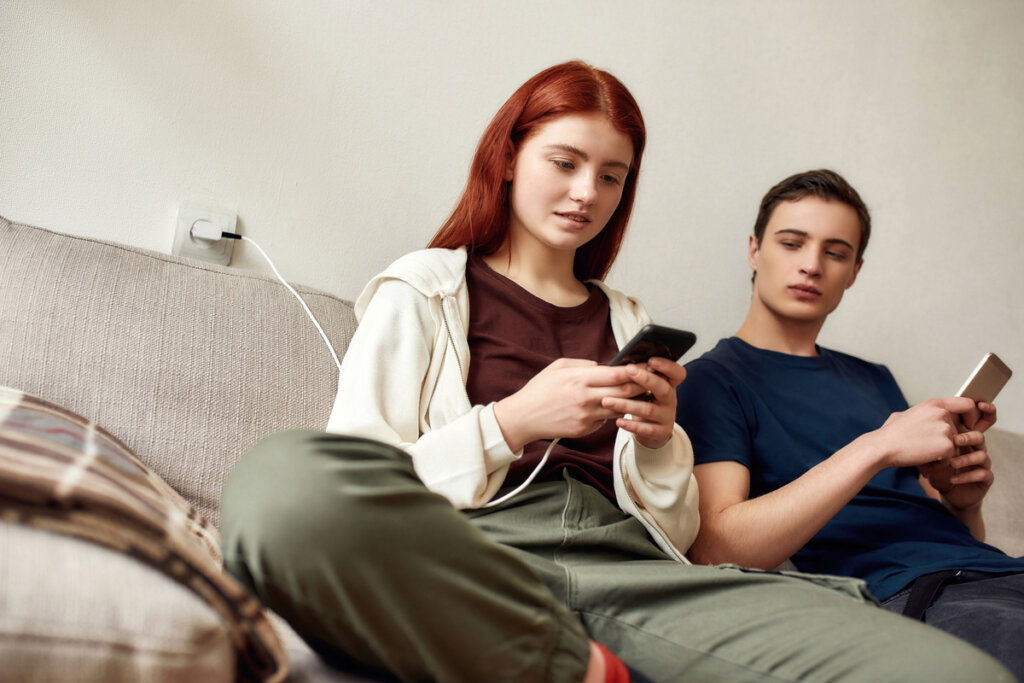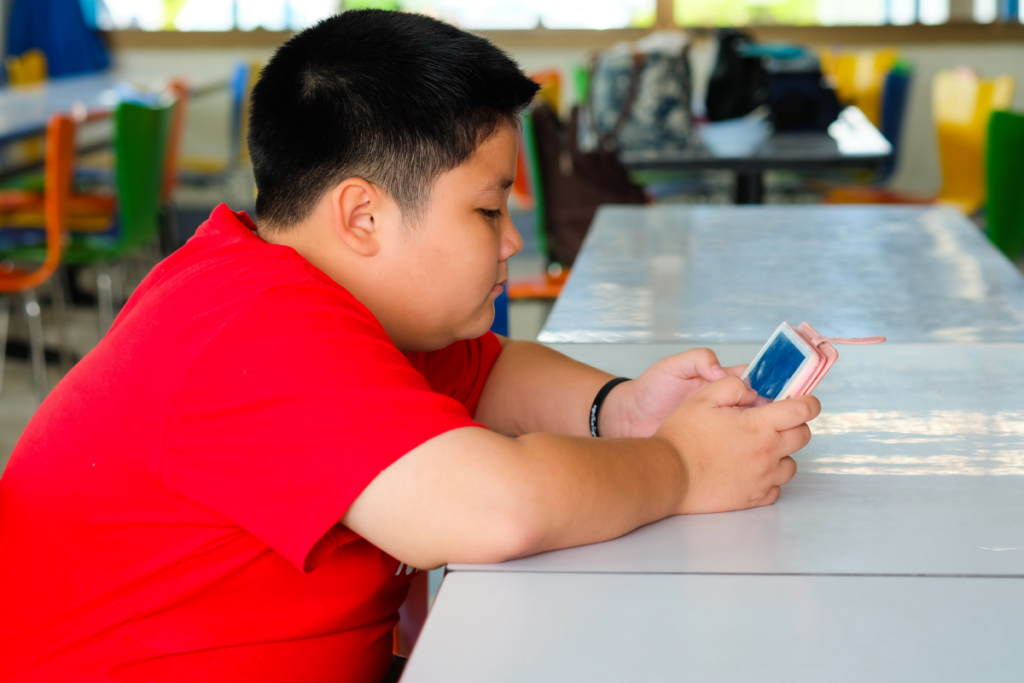What Happens When Young People's Cell Phones Are Taken Away?


Written and verified by the psychologist Valeria Sabater
On average, young people spend about five hours a day connected to their mobile devices. Four of these hours are dedicated to social media. Their favorite is TikTok, an app that they don’t only employ as a means of entertainment and interaction. They also use it to stay informed.
Today, we’ve reached a point where new technologies are no longer so new. In fact, we have entire generations that have been born and raised with them. Digital natives navigate the world through their cell phones and even develop their identities via screens. They learn, relate, and entertain themselves more in this universe of algorithms than in the real world.
Meanwhile, those of us who knew a society without the Internet or Tinder warn our teens of the dangers that stem from their abuse. We try and get them to regulate their use and to be careful about what they expose about themselves online. After all, at the end of the day, we know that these resources are the future and that they make life easier for us all. That said, it’s hard to ignore the cost of cell phones on the mental health of our children.
Research
A study conducted by the University of Toronto (Canada) has detected a significant increase in mental anguish in recent decades. They suggest we need explicit education on how to use technology and social media. Obviously, we want to protect the weakest from their most damaging effects. That said, we must stop merely pointing them out as minefields of danger and recognize the fact that they also have innumerable advantages.
The most everyday technology, and the one that’s abused the most, is the cell phone. So what would happen if we restricted our young people’s use of their devices for a week? Several Spanish universities conducted research in this regard.
For some young people, not having their cell phones was a relief. Their relationships with their families improved and they had more time for activities such as reading.

The research
The University of Malaga, in collaboration with the Complutense University of Madrid, and the Miguel Hernández University of Elche (Spain), conducted this experiment. It was a pioneering investigation in Europe with 97 volunteers aged between 15 and 24 years old. The objective was to know the real impact of the use of cell phones and social media among young people.
The researchers conducted this experiment over a period of three weeks. For the first week, the participants could use their cell phones as much as they wanted. For the second week, they had to disconnect their devices completely. In fact, they went seven days without an internet connection. In the last part of the experiment, they could use them normally.
The researchers had several aims. One of them was to increase the level of awareness about the consequences of the abusive use of cell phones. Another, no less important goal, was to allow the participants to reflect on the sources they use to obtain information. For example, to realize that TikTok isn’t exactly a reliable source.
What were the results? Did it help this group of almost 100 young people to do without the Internet completely during the research period? Let’s find out.
“I felt more anxious than when I try to quit smoking.” This is what many young people said when they couldn’t use their cell phone for 7 days.
Being without their cell phones made them extremely anxious
Many adults have asked what would happen if they were to take their youngsters’ cell phones away from them for a week. The answers, provided by this research, were interesting. The young people felt anxious and insecure since the idea of not being able to connect to social media or communicate with each other made them uncomfortable.
The fact that their usual environment had the technology they craved heightened this feeling. As a matter of fact, the experiences they described were similar to those of any addict in withdrawal. Some even explained that they needed to have their cell phones nearby, even knowing that they had no connection.
Disconnecting from technology allowed them to connect with their families and have more time
This group of young people became aware of the fact that it’s better to live without a cell phone, but it’s impossible to do without it. This idea is contradictory and even ironic, but it’s a fact. Furthermore, it’s not only the youngest of us that think in this way. Indeed, it seems that even those of us who remember the time when cell phones didn’t even exist, can’t give up this technology either.
The researchers discovered that the benefits of the youngsters being separated from their cell phones were as follows:
- They were able to spend more time with their families. Arguments also subsided and there was no longer a reason for them to fight with their parents about the time they spent online. In addition, they were able to watch tv with their parents without being distracted by cell phone messages.
- They were able to finish their academic tasks in less time.
- They enjoyed reading. In fact, they could read books more quickly and in a focused and relaxed manner.
- They admitted that this time of abstinence allowed them to realize their dependence on their cell phones. Not only that, but they also became fully aware of how their mobile devices shaped their lives.
The downside
If we took away cell phones from our young people, something else would also happen. Their social relationships with their peers would suffer. After all, their social universes are woven by their daily online interactions. If these fail, if they lack an online connection, those ties stop being strengthened and they experience high anxiety and discomfort.

The need for media literacy
The recommended age to start using a cell phone is 16 years old. However, today’s children have been using them virtually since they came into the world. At three, four, and five years old they use their parents’ devices, and, by the age of ten, they usually ask for their first cell phone. This forces us to educate them about the use of cell phones at a really young age.
Just as we teach them to read, cross the street or learn a foreign language, we also have to teach them to use cell phones as well. An education that begins by example.
With correct education and intelligent use of technology, youngsters will be able to self-regulate their use of cell phones. They’ll realize that the world extends beyond their screens and that not everything that appears on the Internet is true. In fact, they’ll discover that life can be incredibly enriching if both worlds are combined: the real and the digital.
Therefore, let’s make sure they don’t just live in one universe, that one that bombards us with numerous notifications and infinite scrolling.
All cited sources were thoroughly reviewed by our team to ensure their quality, reliability, currency, and validity. The bibliography of this article was considered reliable and of academic or scientific accuracy.
- Abi-Jaoude E, Naylor KT, Pignatiello A. Smartphones, social media use and youth mental health. CMAJ. 2020 Feb 10;192(6):E136-E141. doi: 10.1503/cmaj.190434. PMID: 32041697; PMCID: PMC7012622.
- La UMA lidera un estudio que revela los problemas de ansiedad e inseguridad que les causa a los jóvenes estar una semana sin móvil https://www.uma.es/sala-de-prensa/noticias/la-uma-lidera-un-estudio-que-revela-los-problemas-de-ansiedad-e-inseguridad-que-les-causa-los-jovenes-estar-una-semana-sin-movil/
This text is provided for informational purposes only and does not replace consultation with a professional. If in doubt, consult your specialist.








